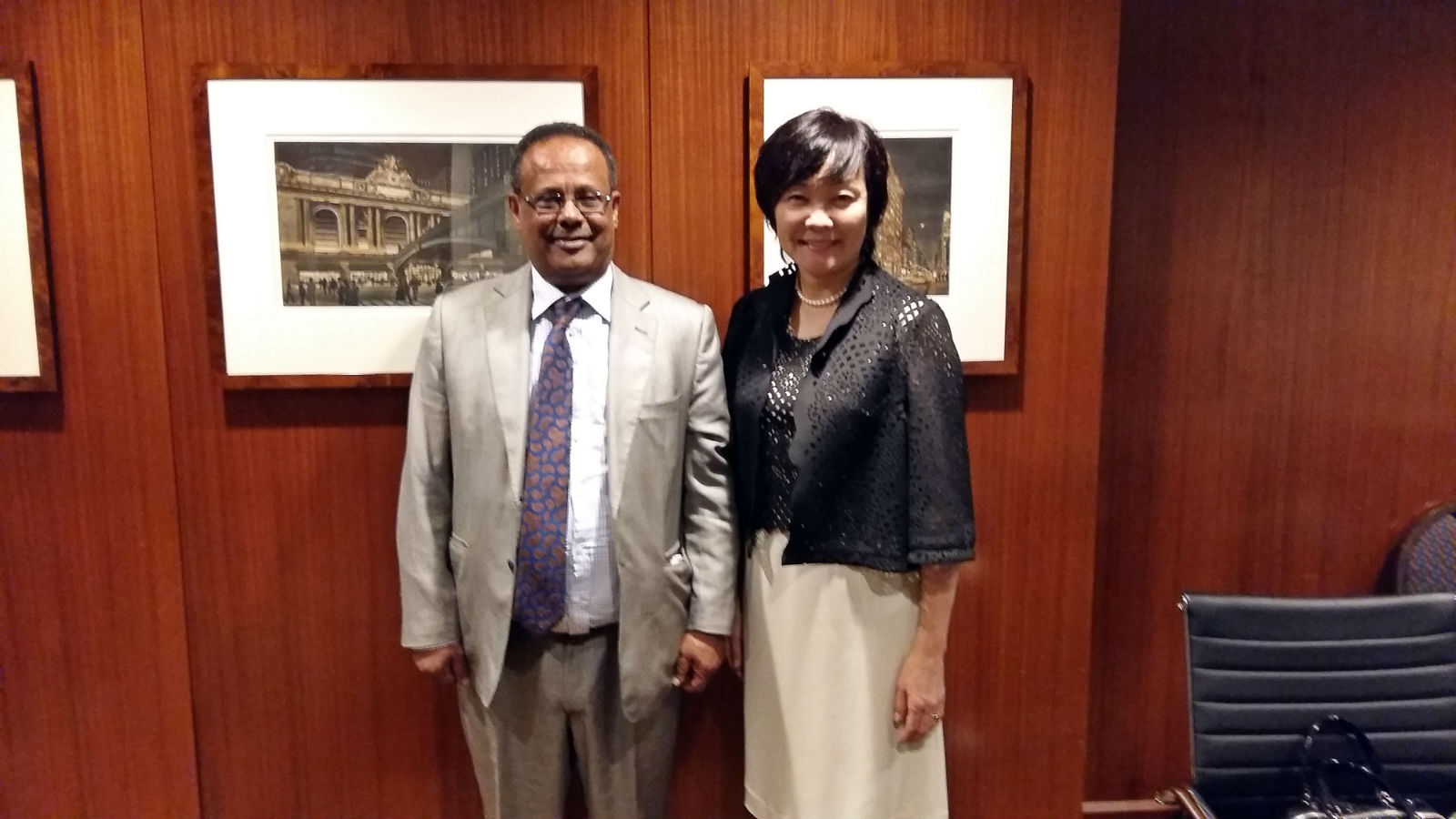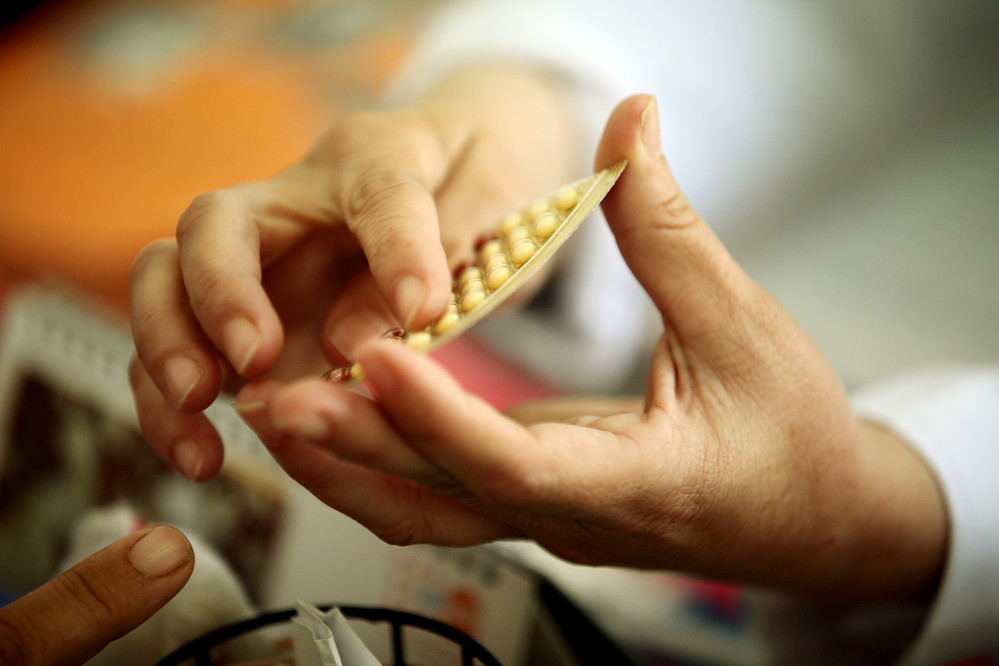
| 15 December 2016
Japan and IPPF take actions together for realizing society where every woman shines
14 December 2016, Tokyo - IPPF attended the World Assembly of Women (WAW!) 2016, which was held in Tokyo on 13-14 December, and made a case that Sexual and Reproductive Health and Rights (SRHR) is fundamental for women’s empowerment, and universal health coverage cannot be achieved without universal reproductive health coverage. At the WAW conference, Japan’s Prime Minister Mr Shinzo Abe said women’s voices are not prioritised in crisis. The international community was not allowed to leave the issue of sexual violence under crisis, he added. Mr Abe stressed that under crisis situations, the international response will be improved remarkably if women’s perspectives are fully incorporated into it. At the same time it is matter of life and death to improve maternal and child health. The international community needs to take action on these issues and give hope to people affected, to build a future together. Tewodros Melesse, Director General of IPPF, said: ‘Poor is the women whose happiness depends on the approval of others. From birth, every women has rights to shine. A comprehensive approach, where empowered women make their own decisions, is the key to ensuring no woman is left behind’ Tewodros Melesse also had a meeting with H.E. Mr Odawara, Japan’s Parliamentary Vice Minister of Foreign Affairs. Mr Odawara said that the Japanese Government highly appreciated IPPF’s activities to respond to women’s needs by closely working with Japan. Mr Melesse raised the issue of global uncertainty, which could give a serious impact on IPPF’s activities to protect women’s health, rights and lives, and requested Japan’s further assistance and continuing strong leadership in the SRHR area.
| 20 October 2016
Let’s accelerate change for rights, power and opportunities for every girl around the world
The International Planned Parenthood Federation (IPPF) welcomes United Nations Population Fund’s 2016 State of the World’s Population (SWOP) report ‘10’’ on the future for young girls at age ten. The human rights of girls across social, economic and political life are deeply intertwined and indivisible. Girls are often left behind, given no voice or an opportunity to aspire for a future. There is no denying that this is the story for many girls in both developing and developed nations around the world. UNFPA’s report demonstrates clearly how the lives of young girls can be changed at the age of 10. It highlights how gender norms for girls can lead to early and forced marriage and having children far too early. Tewodros Melesse, Director General of International Planned Parenthood Federation, said in response to the launch of the UNFPA report today. “Early marriage reduces girls’ access to education, and anticipation of an early marriage often prevents secondary education for girls. When a girl is not able to go to school and receive an education, there is a knock‑on effect on her future work opportunities and also her health. This not only impacts on the individual lives of girls, but also perpetuates systemic gender inequalities where the rights of girls are valued less than that of boys. This is a vicious cycle we have to break. Young girls are a big focus for the Federation. We also work with all those who can help make the shifts that are needed so a girl can decide her own future both freely and safely. Our comprehensive sexuality education is progressive and part of our package of rights-based interventions available through our Member Associations to tackle gender norms but also empower girls in their communities. IPPF puts girls first and the center of what we do. By respecting and fulfilling their right to high quality services. We stand for girls by supporting them in making their own decisions related to their rights, sexuality and pregnancy. We work not only to amplify their voice, but to have them involved, build their resilience and take control of their own destinies. Over the past decade, we have made significant progress to advance girls’ rights to education, health, and security. But we only have to look at the facts to know that more changes are needed. As UNFPA’s report demonstrates, we need to look towards the future and with a positive frame. By protecting girls, giving them access to services and education they will be able to build their own futures as a basic human right. Let’s not turn our backs but accelerate change for better rights, power and opportunities for every girl around the world.”

| 07 October 2016
IPPF welcomes new UN Secretary General
Excellency António Manuel de Oliveira Guterres, I am writing to you to today on behalf of our 152 national Member Associations, and the millions of staff and volunteers that work for the International Planned Parenthood Federation in over 172 countries. We would like to congratulate you on your appointment as the ninth Secretary General of the United Nations, and express our commitment to working with you and the United Nations system throughout your term. As the largest civil society organization working in the area of sexual and reproductive health and rights, we collaborate with United Nations in the advancement of this critical agenda. We believe that a close and constructive relationship with you and your team will continue the development of an enabling environment for the provision of life-saving services, the promotion of gender equality and the realization of all human rights and fundamental freedoms for all. With the world in the first stages of the implementation of the 2030 Agenda, your leadership in the area of sustainable people-centered development is critical; a human rights based approach, gender equality and the realization of sexual and reproductive health and rights is central to achieving progress under all of the sustainable development goals and targets. We encourage you to ensure that these issues remain priorities for you and the United Nations and offer our support to do so. With your leadership and support, we will be able to ensure that all women and girls have access to family planning services, can live free from violence and are able and empowered to participate fully in the life of their communities. As an organization working for gender equality we were delighted to hear you pledge to ensure gender parity at the UN and your promise to work for the promotion, protection and respect of women’s rights. I, alongside IPPF Member Associations and partners, stand ready to work with you in your new role and to set in place the programs and initiatives that will ensure 2030 Agenda is fully implemented. Working together, we can achieve the ambitious goals that the global community set just one year ago, and ensure that truly no one is left behind. Yours sincerely, Tewodros Melesse Director General

| 21 September 2016
Japan’s First Lady and IPPF together for a world without discrimination
Japan’s First Lady, Her Excellency Mrs Akie Abe, and IPPF’s Director General Tewodros Melesse have agreed on the need to continue the fight to strengthen women’s health and rights, in a High Level Meeting in the margins of the UN General Assembly 2016 in New York. Japan is a strong supporter of IPPF’s work in the area of sexual and reproductive health and rights, and Mrs Abe has a personal commitment to improving the lives of women through her work with the World Assembly of Women (WAW), an initiative launched by her husband His Excellency Mr Shinzo Abe, the Prime Minister of Japan, in 2014 to create a society where women shine. Mrs Abe has spoken before about the need to tackle discrimination against disenfranchised communities, and noted again in her meeting with Mr Melesse the discrimination faced by the LGBTQI community. Mr Melesse said: “Mrs Abe is a tireless supporter of the rights of women and communities which face discrimination, such as the LGBTQI community. IPPF and Mrs Abe share the goal of empowering women and building a world without discrimination. I look forward very much to working more closely with Mrs Abe in the future.”
| 01 July 2016
Ex-IPPFWHR Regional Director wins UN Award
Carmen Barosso, previous Regional Director for IPFPWHR, has been recognised for her dedication to increase sexual and reproductive health care and to empower women to demand their rights. Winning the United Nations Population Award, Camen said that sexual and reproductive health is intextricable from human rights. “Putting sexual and reproductive health and rights at the heart of population and development policies” was a turning point, Ms. Barroso said in her acceptance speech. It helped to “unleash a cultural sea change, a new language, and new ways of thinking.”

| 31 May 2016
Pakistan’s contraceptive advertising ban reversal welcomed by IPPF in South Asia
Ms. Anjali Sen, Regional Director, IPPF-South Asia Region said “It comes as a huge relief that Pakistan Electronic Media Regulatory Authority (PEMRA) has decided to reconsider its blanket ban on all advertisements of contraceptives in the electronic media. In the first place, it was an ill-considered order in the backdrop of the fact that Pakistan has the highest population growth, birth and fertility rates among the South Asian countries, including Bangladesh, India, Sri Lanka, the Maldives, Bhutan and Nepal. This blanket ban had raised serious questions because the Contraceptive Prevalence Rate (CPR) for women in reproductive age in Pakistan is an abysmal 35.40, as per 2013 figures. Given the realities of fertility rates and population growth in Pakistan, the Pakistani policy makers must understand that information on contraceptive choices is the key. From around the world, we have many examples on how a desire for smaller families have led to greater investments in family planning, which have helped transform the age structure and consequently contributed to overall well-being. If the power of media, including the electronic media is harnessed, Pakistan will not stare at a projected 342 million people by 2050. Pakistani policy makers will appreciate that such population explosion will ultimately jeopardize the gains that Pakistan has made over the last few decades. A blanket ban on all contraceptive commercials in electronic media would have been counter-productive and it would have unspeakably harmed Pakistan’s national interest in slowing the population growth. If anything, the state and its agencies should actively facilitate free flow of information on contraceptives and the choices available if Pakistan has to achieve its population and development priorities. As a leading provider and advocates of family planning, South Asia Regional Office of IPPF welcomes PEMRA’s withdrawal of a blanket ban on advertisement of contraceptive products on Pakistani electronic media."







